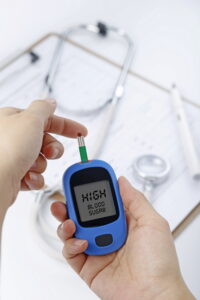Blood Sugar Management: A Comprehensive Guide
Maintaining healthy blood sugar levels is essential for overall health, especially for individuals with diabetes or prediabetes. Uncontrolled blood sugar can lead to complications like heart disease, kidney problems, nerve damage, and vision issues. Fortunately, with the right lifestyle changes and habits, you can effectively manage your blood glucose.

Below is a detailed guide on how to control blood sugar levels naturally and through medical support.
Comprehending Blood Sugar
The body uses glucose, also known as blood sugar, as its primary energy source. It is derived from your diet and controlled by the pancreatic hormone insulin.
Normal levels of blood sugar:
1. 70–100 mg/dL while fasting
2. Less than 140 mg/dL two hours after eating
It’s best to speak with a doctor for individualized goals because target levels may differ slightly for diabetics.
1. Consume a Healthy, Balanced Diet
(A) Select Foods That Are Low in Glycemic
Foods with a low glycemic index (GI) release sugar gradually, avoiding spikes. Incorporate:
1. Whole grains (quinoa, brown rice, and oats)
2. Legumes (beans, lentils)
3. Vegetables, particularly those with leaves
4. Fruits (such as oranges, berries, and apples)
(B) Regulate Intake of Carbohydrates
Your blood sugar is directly impacted by carbohydrates. Make use of portion control or “carb counting”:
1. Steer clear of refined carbohydrates such as soda, sugary snacks, and white bread.
2. Instead, opt for complex carbohydrates.
(C) Consume More Fiber
Fiber slows down the absorption of sugar. Among the foods high in fiber are
1. Skin-on fruits and vegetables
2. Whole grains
3. Seeds and nuts
(D) Never Miss a Meal
To prevent sugar dips and spikes, eat smaller, more frequent meals.
2. Maintain an Active Lifestyle
The body uses insulin more efficiently when you exercise.
Activities that are suggested:
1. Cycling, swimming, jogging, and brisk walking
2. Stretching and yoga
3. Strength training two or three times per week
Every day, try to get in at least 30 minutes of moderate exercise. Particularly if you are on insulin, check your blood sugar levels before and after working out.
3. Handle Stress
Stress causes hormones like cortisol to be released, which can cause blood sugar levels to rise.
Advice for lowering stress:
1. Mindfulness or meditation
2. Practices for deep breathing
3. Playing soothing music
4. Getting enough sleep (7 to 9 hours a night)
4. Drink plenty of water
Water consumption aids in the kidneys’ removal of extra sugar through urine. Unless otherwise recommended, try to consume 8–10 glasses of water each day.
5. Keep an eye on your blood sugar levels
Regularly check your levels with a Continuous Glucose Monitor (CGM) or glucose meter. This aids in your comprehension of how your body responds to particular foods, activities, and prescription drugs.
6. Steer clear of these triggers
1. Sugary foods include candies, sweetened beverages, and desserts.
2. Alcohol can lead to both dangerous lows and highs.
3. Smoking: raises the possibility of problems
4. Fried and processed foods
7. Take prescription drugs as directed.
Your doctor might recommend the following if lifestyle modifications are insufficient:
1. Oral drugs such as Metformin
2. Insulin pumps or injections
3. Additional medications depending on your health
5. Never skip doses, and inform your doctor of any side effects.
8. Natural Solutions (As Suggested by a Physician)
A few natural supplements could aid in blood sugar regulation:
1. Fenugreek seeds
2. A hint of cinnamon
3. a bitter melon
4. Juice from aloe vera
(Use only after speaking with your doctor.)
9. Routine Medical Examinations
Obtain standard tests such as
1. HbA1c (every three to six months)
2. Kidney function
3. Exams of the feet and eyes
Better results are achieved when complications are identified early.
Last Advice
1. To keep track of meals and blood sugar levels, use an app or keep a food journal.
2. Learn how to manage your diabetes.
3. Seek assistance from a diabetes coach, family, or friends.
End
Maintaining blood sugar control takes a lifetime of dedication. You can live a long, healthy life and avoid complications by combining a nutritious diet, consistent exercise, stress reduction techniques, and medical assistance. Before making significant changes to your routine, always get your doctor’s approval.